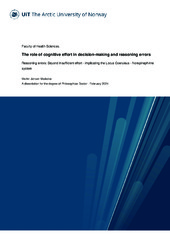Can we reliably measure cognitive effort? On the relation of implicit and explicit cognitive effort scales and tasks.
Permanent lenke
https://hdl.handle.net/10037/24674Dato
2021-04-01Type
MastergradsoppgaveMaster thesis
Forfatter
Mækelæ, Martin JensenSammendrag
We tend to choose the action that is least demanding however measuring individual differences in the cost of cognitive effort can be elusive. We here report a set of five studies studying the relationship between four cognitive effort measures: the demand selection task, the cognitive effort discounting paradigm, a rationality battery to assess deliberate reasoning, and the Need for Cognition scale. We also measured working memory capacity in four studies. Subjective effort with the NASA task load index was measured in three studies. Need for Cognition was positively associated with effort spent in the cognitive effort discounting paradigm, and was also positively associated with deliberate reasoning, but there was no association with demand avoidance in the demand selection task. Working memory capacity was not related to Need for Cognition, demand avoidance or cognitive effort discounting but to deliberate reasoning. We conclude that the tasks may not measure the same latent cognitive effort construct. We discuss task-sensitivity in measuring cognitive effort, and the necessity to control for cognitive abilities.
Forlag
UiT Norges arktiske universitetUiT The Arctic University of Norway
Metadata
Vis full innførselSamlinger
Copyright 2021 The Author(s)
Følgende lisensfil er knyttet til denne innførselen:
Med mindre det står noe annet, er denne innførselens lisens beskrevet som Attribution-NonCommercial-ShareAlike 4.0 International (CC BY-NC-SA 4.0)
Relaterte innførsler
Viser innførsler relatert til tittel, forfatter og emneord.
-
Rationality: Can it be predicted by cognitive effort, ability and thinking disposition? On the role of willingness to exert cognitive effort, thinking disposition and executive function on deliberate reasoning tasks both with and without a heuristic response.
Klevjer, Kristoffer (Master thesis; Mastergradsoppgave, 2019-05-02)Å bruke intuisjon og magefølelsen, når det som egentlig kreves er nøye resonnering kan føre til feilaktige vurdering og beslutninger, ikke bare på quiz, men også ha store konsekvenser i hverdagen. Så hvorfor gjør vi det? En vanlig forklaring er at vi gjøre det fordi det er strevsomt og krever innsats å bedrive nøye resonnering, innsats vi til vanlig ikke liker. In denne studien kastet vi lys over ... -
The role of cognitive effort in decision-making and reasoning errors. Reasoning errors: Beyond insufficient effort - implicating the Locus Coeruleus - Norepinephrine system
Mækelæ, Martin Jensen (Doctoral thesis; Doktorgradsavhandling, 2024-05-24)Cognitive effort is highly familiar in everyday life and may influence our decisions and task performance. However, researchers have struggled to both define and measure cognitive effort. A range of tools measuring cognitive effort has been developed within different lines of research. Yet it is unclear to what degree these tools are related and if they are measuring the same cognitive effort ... -
The Incredible Years Teacher Classroom Management Programme in Kindergartens: Effects of a Universal Preventive Effort
Fossum, Sturla; Handegård, Bjørn Helge; Drugli, May Britt (Journal article; Tidsskriftartikkel; Peer reviewed, 2017-04-21)The purpose of this study was to identify preventive effects of the Incredible Years (IY) teacher classroom management (TCM) programme, which is employed in Norwegian kindergartens for 3-year-old to 6-year-old children. IY TCM is a universal preventive intervention intended to reduce the frequency of inappropriate types of behaviour and support children’s social- and emotional competence in kindergartens ...


 English
English norsk
norsk



